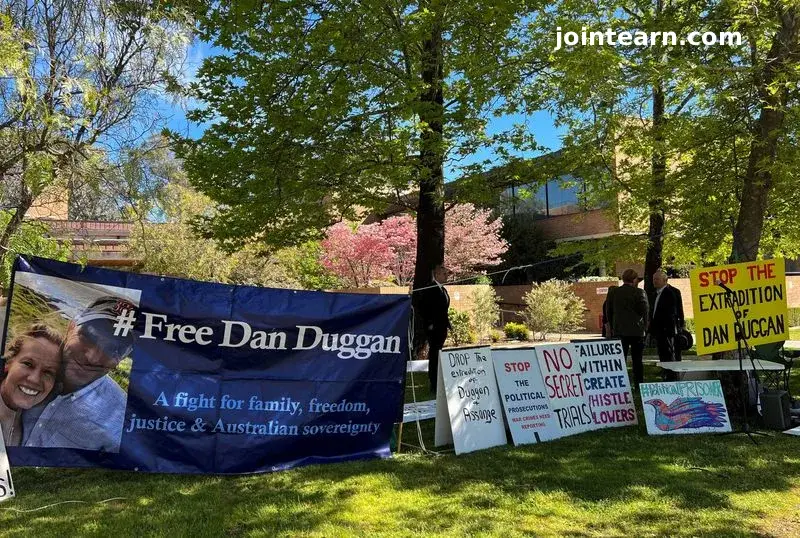
Former U.S. Marine Corps pilot Daniel Duggan appeared before the Federal Court of Australia on Thursday to appeal his extradition to the United States, where he faces charges of violating U.S. arms control laws by allegedly training Chinese military pilots more than a decade ago.
His case, which has drawn attention across Australia, the United States, and China, could set a legal and diplomatic precedent for how allied nations handle U.S. extradition requests in politically charged national security cases.
A Case Stirring Global and Legal Debate
Duggan, 57, who became a naturalised Australian citizen, was arrested in October 2022 in the rural town of Orange, New South Wales, after returning from China, where he had lived since 2014.
He has been detained in an Australian maximum-security prison for nearly three years, awaiting a decision on whether he will be sent to the United States to face trial.
The former U.S. Marine is accused of training Chinese military pilots on how to land fighter jets on aircraft carriers — activities that the U.S. government claims breached its arms export and defense trade regulations.
Australia’s then–Attorney-General Mark Dreyfus approved Washington’s extradition request in December 2024, prompting Duggan’s legal team to appeal the decision on the basis that his alleged actions were not a crime under Australian law at the time.
Defense: “Uncharted Territory” for Australia
Appearing in court on Thursday wearing a navy-blue suit, Duggan listened attentively to his legal team’s submissions and thanked the judge afterward “for allowing [him] to see justice done.”
His lawyer, Christopher Parkin, argued that the extradition case was “uncharted territory” in Australian law and violated the principle of dual criminality — the requirement that an offence must be illegal in both countries for extradition to proceed.
“This is a fairly extraordinary case,” Parkin told the court.
“The offences must be punishable under the laws of both parties at the time when the relevant conduct occurred. You can’t punish someone in this country for something they did ten years ago that wasn’t an offence at the time.”
The defense maintains that Duggan’s training activities occurred between 2010 and 2012, primarily in South Africa, and that there is no evidence the pilots he trained were members of the Chinese military.
They also argue that Duggan had renounced his U.S. citizenship in 2016 at the U.S. Embassy in Beijing, with the official certificate backdated to 2012 — before the alleged offenses were said to have taken place.
Prosecution: “No Legal Barrier to Extradition”
Representing the Australian government, Trent Glover, counsel for the Attorney-General, countered that Parkin’s argument was based on a misinterpretation of extradition law, stating that nothing prevents Duggan from being sent to the United States.
According to a 2017 U.S. indictment, Duggan allegedly violated a U.S. arms embargo on China by providing “aviation services” and “assessment of aircraft carrier training” to Chinese entities. The U.S. Justice Department claims this work directly supported the Chinese military’s development of carrier-based aviation capability, a highly sensitive area of defense technology.
If extradited and convicted, Duggan could face decades in a U.S. federal prison.
Political and Diplomatic Ramifications
The Duggan case has become a flashpoint in U.S.–China–Australia relations, with his supporters calling him a victim of geopolitics caught between two superpowers.
His wife, Saffrine Duggan, has led a sustained public campaign to block his extradition, arguing that her husband is being “used as a pawn in an ideological war” between Washington and Beijing.
“It’s been a real struggle,” she told Reuters outside the court in Canberra.
“We just want Dan to come home.”
A small but vocal group of demonstrators gathered outside the courthouse, holding signs reading “Free Daniel Duggan” and “Australia is not America’s jailer.”
Human rights advocates and legal scholars have also expressed concern that the case tests Australia’s sovereignty and its commitment to fair trial protections under its extradition treaty with the United States.
Background: The Path to Arrest
Duggan, who once flew AV-8B Harrier jump jets for the U.S. Marine Corps, moved into the civilian aviation training industry after leaving military service. He worked with companies that provided flight simulation and carrier training, including some linked to China’s growing aviation sector.
His arrest in 2022 came amid growing U.S. scrutiny of Western military experts training foreign pilots, particularly after reports emerged of British and Australian ex-military instructors working with China’s People’s Liberation Army (PLA) through private aviation firms in South Africa.
Following these revelations, the U.S., U.K., and Australia jointly warned their veterans that sharing military aviation expertise with foreign governments could constitute national security violations.
What Happens Next
The Federal Court will continue to review submissions over the coming weeks before issuing a ruling on whether the extradition order will stand or be overturned.
If the court rejects Duggan’s appeal, the final decision would return to Attorney-General Dreyfus’s office, which has discretion to approve or deny extradition.
For now, Duggan remains in custody, awaiting a verdict that could determine whether he faces trial in the United States or freedom in Australia after three years behind bars.


Leave a Reply